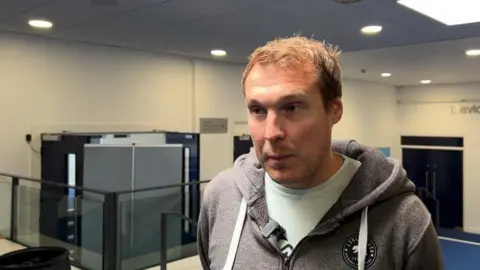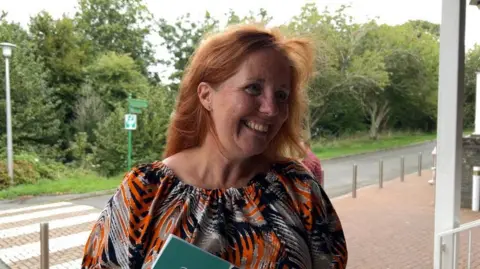Teachers schooled on new tech and additional needs
 BBC
BBCTeachers in Guernsey have been educated on digital technology and the States' new code of practice for additional needs this week.
All teachers at States-run schools have been attending a two-day training conference in St Peter Port.
Speakers from Guernsey and the UK have been talking about the new code of practice for additional learning needs and the digital transformation which is underway across all schools.
A spokesperson for Education said it was the first time all teachers in Guernsey "are meeting together to share a deeper understanding of our education strategy".
Mark Hughes, from Forest Primary, said the introduction of new technology was "very exciting".
Mr Hughes said the new interactive screens were "worlds away from what we've had before" and would "transform teaching in a huge amount of ways".
He said the new screens linked up with tablets and allowed teachers and pupils to draw, model and watch videos, giving students "more availability to resources that we didn't have before".
But he said the new technology did not spell the end for pencil and paper just yet.
He said: "There's absolutely a place for them both.
"It's about how you teach, what you teach and why."
Handwriting was important for "fine motor skills" he said, but a "broad balanced curriculum" could "support and enhance teaching and learning".
'Guernsey should be proud'

Dr Julie Wharton, co-coordinator of the special educational needs policy research forum and a senior lecturer at the University of Winchester, said the island was "ahead of the game" on its additional needs strategy, adding "Guernsey should be proud".
She said a code of practice is a "guidebook for the legislation" to help teachers and parents who "don't want to look at the law".
It was "more accessible and understandable", she added.
Dr Wharton explained Guernsey's code of practice took an "interactive approach" which blended both the social and medical models of disability.
Traditionally, there are two models of disability and additional needs, she explained.
The medical model, or "deficit model", "treats children as the problem" while the social model focusses on problems with their environment.
For example, a child with ADHD would be seen as needing treatment under the medical model, such as with medication or behavioural adjustment.
In the social model the school looks at what "reasonable adjustments" could be made to help the child, such as taking "regular breaks", she said.
The States' new approach focusses on how both approaches "interact together", Dr Wharton said.
"The voice of learner is at centre - everybody needs to work together."
'Singing from the same hymn sheet'
Jerry Thomas, from Vauvert school said: "I think it's excellent - all teachers are having the same message and we're supporting each other.
"Everybody's singing from the same hymn sheet."
She praised the "detailed and big support package" that was in place allowing teachers to share good practice among colleagues.
Ms Thomas said the new code of practice modernised the way children with additional needs were treated.
"Long gone are the days when children are in a corridor by themselves."
Follow BBC Guernsey on X (formerly Twitter) and Facebook. Send your story ideas to [email protected].
